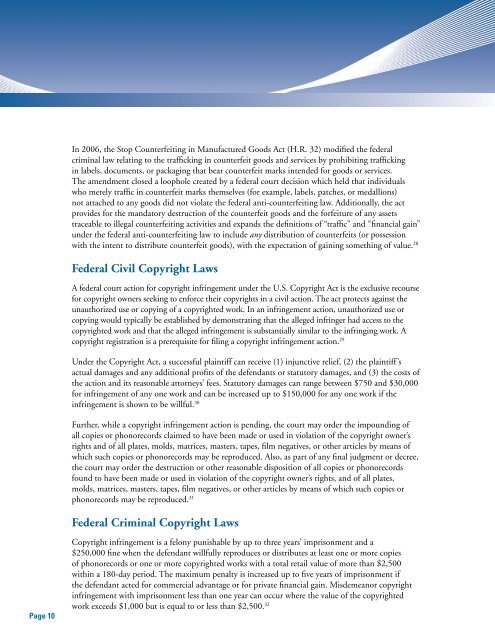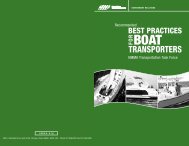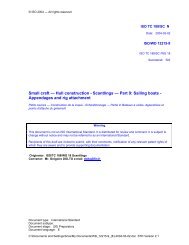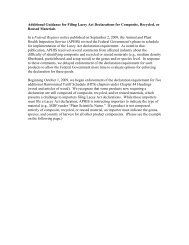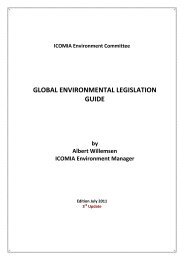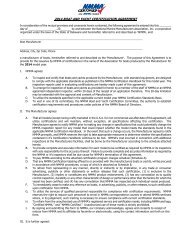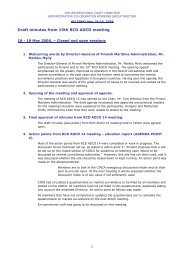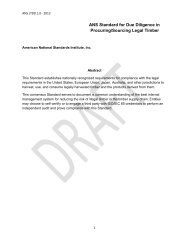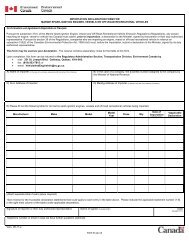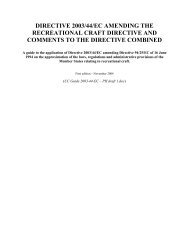Intellectual Property Protection and Enforcement Manual - Ipr-policy.eu
Intellectual Property Protection and Enforcement Manual - Ipr-policy.eu
Intellectual Property Protection and Enforcement Manual - Ipr-policy.eu
You also want an ePaper? Increase the reach of your titles
YUMPU automatically turns print PDFs into web optimized ePapers that Google loves.
In 2006, the Stop Counterfeiting in Manufactured Goods Act (H.R. 32) modified the federal<br />
criminal law relating to the trafficking in counterfeit goods <strong>and</strong> services by prohibiting trafficking<br />
in labels, documents, or packaging that bear counterfeit marks intended for goods or services.<br />
The amendment closed a loophole created by a federal court decision which held that individuals<br />
who merely traffic in counterfeit marks themselves (for example, labels, patches, or medallions)<br />
not attached to any goods did not violate the federal anti-counterfeiting law. Additionally, the act<br />
provides for the m<strong>and</strong>atory destruction of the counterfeit goods <strong>and</strong> the forfeiture of any assets<br />
traceable to illegal counterfeiting activities <strong>and</strong> exp<strong>and</strong>s the definitions of “traffic” <strong>and</strong> “financial gain”<br />
under the federal anti-counterfeiting law to include any distribution of counterfeits (or possession<br />
with the intent to distribute counterfeit goods), with the expectation of gaining something of value. 28<br />
Federal Civil Copyright Laws<br />
A federal court action for copyright infringement under the U.S. Copyright Act is the exclusive recourse<br />
for copyright owners seeking to enforce their copyrights in a civil action. The act protects against the<br />
unauthorized use or copying of a copyrighted work. In an infringement action, unauthorized use or<br />
copying would typically be established by demonstrating that the alleged infringer had access to the<br />
copyrighted work <strong>and</strong> that the alleged infringement is substantially similar to the infringing work. A<br />
copyright registration is a prerequisite for filing a copyright infringement action. 29<br />
Under the Copyright Act, a successful plaintiff can receive (1) injunctive relief, (2) the plaintiff’s<br />
actual damages <strong>and</strong> any additional profits of the defendants or statutory damages, <strong>and</strong> (3) the costs of<br />
the action <strong>and</strong> its reasonable attorneys’ fees. Statutory damages can range between $750 <strong>and</strong> $30,000<br />
for infringement of any one work <strong>and</strong> can be increased up to $150,000 for any one work if the<br />
infringement is shown to be willful. 30<br />
Further, while a copyright infringement action is pending, the court may order the impounding of<br />
all copies or phonorecords claimed to have been made or used in violation of the copyright owner’s<br />
rights <strong>and</strong> of all plates, molds, matrices, masters, tapes, film negatives, or other articles by means of<br />
which such copies or phonorecords may be reproduced. Also, as part of any final judgment or decree,<br />
the court may order the destruction or other reasonable disposition of all copies or phonorecords<br />
found to have been made or used in violation of the copyright owner’s rights, <strong>and</strong> of all plates,<br />
molds, matrices, masters, tapes, film negatives, or other articles by means of which such copies or<br />
phonorecords may be reproduced. 31<br />
Federal Criminal Copyright Laws<br />
Page 10<br />
Copyright infringement is a felony punishable by up to three years’ imprisonment <strong>and</strong> a<br />
$250,000 fine when the defendant willfully reproduces or distributes at least one or more copies<br />
of phonorecords or one or more copyrighted works with a total retail value of more than $2,500<br />
within a 180-day period. The maximum penalty is increased up to five years of imprisonment if<br />
the defendant acted for commercial advantage or for private financial gain. Misdemeanor copyright<br />
infringement with imprisonment less than one year can occur where the value of the copyrighted<br />
work exceeds $1,000 but is equal to or less than $2,500. 32


